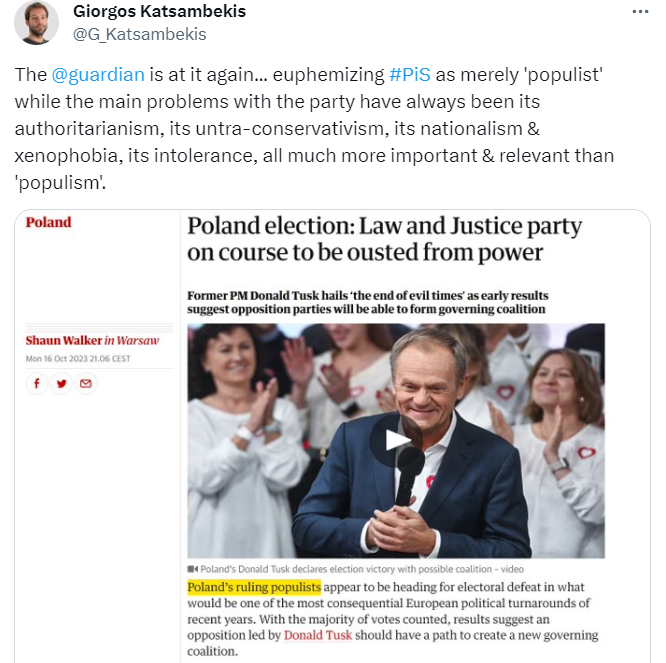In this interview we talk with Giorgos Katsambekis about the process of mainstreaming of authoritarianism. The topics approached in this conversation are extremely relevant given the current Zeitgeist. In these days Donald Trump is trying a comeback after the 2021 failed coup, in Italy 1000 fascists gathered in Rome to commemorate their dead camerati, with a great display of fascist salutes and Celtic crosses, while the French ‘moderate Right’ approved a controversial anti-immigration bill that the radical Right considers a victory.
Katsambekis offers a lucid account of the processes that make it possible for authoritarian ideas, values, and discourses to move from the margins of the public debate to its very centre, combining a profound theoretical reflection with concrete examples from France, Greece, the United States, and the European Parliament.
Enjoy the read…
POP) Giorgos, you have been researching populism and anti-populism for quite a long time (including an amazing interview we did back in 2018). In your new work, you moved towards the concept of authoritarianism. What was the reason for this choice?
GK) Throughout the years I’ve been studying populism, I have consistently felt rather uncomfortable with how the term has been misused and abused to describe other concepts and phenomena. The first and most obvious conflation has been of populism with the Far Right and its ideas, which leads to confusion between populism and nationalism, xenophobia, euroscepticism, etc. This has already been addressed in the literature on the ‘populist hype’, in studies that examine how ‘populism’ operates as a signifier and in works that explore how the Far Right is normalized and mainstreamed. Despite such significant advancements in the field, I still felt that something was missing.
We have been discussing how the use of populism as a label for the Far Right and its ideas serves as a euphemism, contributing to the mainstreaming of xenophobic nationalism and racism. However, we have not given sufficient attention to another crucial feature of the far right, one that it often shares with more traditional political forces: authoritarianism.
POP) So basically populism has been used instead of the term “authoritarian”?
GK) Indeed, authoritarianism is frequently obscured behind the label of ‘populism’ or that of ‘illiberalism,’ sometimes even plainly ignored. This becomes apparent when we examine, for example, media coverage and some scholarly works on democratic erosion in Hungary and Poland. Populism has played a relatively secondary, peripheral role in these contexts, yet it consistently re-emerges as the main culprit of the story, with authoritarianism ignored, implied, or remaining concealed behind the label of ‘populism.’
Moreover, by focusing on the danger of illiberal populists and nationalists and reducing everything to simplifying dualisms like ‘bad populists’ versus ‘good liberals,’ both journalists and academics seem to have overlooked the fact that mainstream or ‘moderate’ parties and politicians have also become more nationalist, more xenophobic, and indeed more authoritarian in recent years.
Thus, by specifically focusing on authoritarianism and disentangling it from other concepts and actors, I hope to draw attention to a set of specific practices and ideas that often go under the radar but are steadily eroding democratic norms. These practices if left unchallenged, could potentially lead to democratic backsliding and even authoritarianism.

POP) Conceptual clarity is essential, as it clearly emerges from your replies. Before we move on, we must talk definitions: what is authoritarianism? And what does it have to do with concepts such as ‘illiberalism’, ‘anti-pluralism’, or ‘demagoguery’?
GK) There are two concurrent bodies of literature on authoritarianism, both with distinct merits. One focuses on individual attitudes and predispositions, rooted in the Authoritarian Personality of the Frankfurt School, while the other centres on institutions, structures, and policies, with its foundations in the work of Juan Linz (among others). It is impossible to fully do justice to both traditions here. Regardless, my argument is based on the assumption that there is a dimension overlooked by both, thus I’m attempting to navigate a course between and across the two classic approaches by drawing on Marlies Glasius’ recent work, which views authoritarianism as a set of practices.
In my recent article, I suggest defining authoritarianism as ‘a set of practices centred around a rigid notion of authority, characterised by the employment of actions/policies aiming to consolidate a strictly ordered society, limit accountability, and counter deviance’. These practices are often discursive or operate at the level of ideas, shaping personal beliefs, attitudes, and predispositions. However, they can also materialise into concrete policies and institutional reforms, influencing the structural configurations of societies. The idea is that such a dynamic understanding of authoritarianism, besides facilitating a more comprehensive grasp of the phenomenon by incorporating both the individual/behavioural and the institutional/structural level, allows us to highlight the active role and agency of political actors in cultivating and diffusing authoritarian ideas and implementing corresponding policies, thus shaping political systems and regimes.
Understood in this way, authoritarianism is both distinct and often intertwined with other practices or discourses, such as ‘illiberalism’, primarily referring to infringements on individual freedom and autonomy, or ‘anti-pluralism’, which indicates rather intolerant and monist conceptions of society, whether at the ethnic or religious level or that of political ideas and ways of living – the conceptual borders between them are rather porous, of course, and they often tend to coincide. Demagoguery – a term I find somewhat problematic – can be understood as a discursive practice based on manipulating large groups of people by deceiving or misinforming them. Again, it is distinct from, but often concurrent with authoritarianism. Conceptual clarity enables us to be specific in our categorisations but also in our assessments of causality, better understanding what causes or may cause specific outcomes.
POP) You claim that authoritarianism is ‘mainstreaming’. Can you explain this process? What does ‘mainstreaming’ mean?
GK) I’m borrowing the term ‘mainstreaming’ from the work of Aurelien Mondon, Katy Brown and Aaron Winter, who have applied it mostly to the Far Right. In my understanding, mainstreaming refers to an often gradual and sometimes subtle process that shifts specific ideas, discourses and policies from the margins of political systems, legislation and public debate to the centre. It’s a process through which these ideas and the individuals or collectives promoting them become normalized, altering the threshold of acceptability in public discourse and policy-making. This, in turn, reshapes perceptions of what is considered ‘normal’, legitimate, or compatible with democracy, thereby influencing public attitudes against certain positions and practices. To put briefly: mainstreaming, in politics, has to do with the erosion and shifting of (democratic) norms.
In practice, the mainstreaming of the Far Right in particular, usually manifests in the following ways: (1) through the steady move of centrist actors towards more radical or even extreme positions (take the Republican party in the US as an example, which had already moved towards more nationalist/nativist and authoritarian positions before Donald Trump’s takeover, or the French centre-Right’s further drift to the Right from around 2005 onwards); (2) through the over-representation, ‘hyping’, and normalisation of Far Right parties and their ideas in the media; (3) through the acceptance of Far Right parties as viable partners in coalition governments. In all scenarios, it is the Far Right that benefits and its ideas that receive enhanced credibility, visibility and legitimation.

POP) The process of mainstreaming authoritarianism does not happen on its own, or so your argument goes. You identify several actors that are responsible for this process, such as the media for example. How can different actors mainstream authoritarianism?
GK) The mainstreaming of authoritarianism, as I understand it, is a complex process involving political parties, institutions, major media outlets, public intellectuals, and even international organizations and transnational corporations. The actors of particular interest to me are those parties and politicians perceived as positioned close to or around the ‘centre’ of the political spectrum, often labelled as ‘moderate’ or mainstream political forces. These are parties traditionally viewed as standard contenders for office, enjoying enhanced legitimacy to govern in the eyes of the broader public (though, of course, this perception is fluid and malleable). If we refer to the European Parliament to identify such actors, we would place within the ‘mainstream’ the members of the European People’s Party (Christian Democrats and Conservatives), those comprising the Alliance of Liberals and Democrats for Europe Party (ALDE), and those in the Party of European Socialists (PES).
Relevant research indicates that politicians from such parties play a privileged role in either upholding or eroding democratic norms. In other words, what they say and do carries more weight than their radical or extreme counterparts when it comes to influencing how citizens perceive certain issues and comply with norms in society. As Valentim, Ziblatt and Dinas explain, this may be due to ‘mainstream politicians representing the views of a larger part of the population, or having higher status’.
Now, when it comes to authoritarianism in particular, we can observe specific practices related to (1) the concentration of power at the executive level; (2) the potential undermining or impairment of channels and institutions of accountability; (3) the treatment of voices of dissent (i.e. whether these are stigmatised, marginalised, or undermined); (4) the potential influence on the media and restrictions on press freedom; (5) the restriction of fundamental rights in the name of security and public order; (6) the obstacles faced by artistic and academic freedom; and (7) the ease with which governments can declare emergencies to enforce extraordinary powers. In the last decade, several mainstream parties across Europe have increasingly taken such actions and legislated corresponding policies, often using a discourse centred on ‘democracy’ to legitimise them.
For instance, in early 2021, the conservative Greek Prime Minister, Kyriakos Mitsotakis, described the enforcement of a permanent police force within university campuses as ‘the cool breeze of democracy’; a truly chilling metaphor. Fortunately, the relevant legislation proved ineffective and has been practically dropped, but the damage to academic freedom was done. Apart from Mitsotakis, and his party, New Democracy, that have also been entangled in a far-reaching wiretapping scandal, we can observe the diffusion of authoritarian discourse and practices in Emmanuel Macron’s concentration of powers, in the handling of protesters by the French police, and in his government’s increasingly anti-Islam position. Finally, the Conservatives in the UK serve as another prominent example of a mainstream party becoming more authoritarian, evident in the party’s attacks against academic freedoms (under the pretext of ‘free speech’), their efforts to undermine the role of parliament during the peak of the Brexit crisis and the party’s now notorious migration policy.

POP) In conclusion, let’s go back to the first question: do you think that talking about populism for so many years helped authoritarian parties and leaders? And what can be done to challenge the electoral success of authoritarian actors?
Mislabelling authoritarian, ultra-conservative and Far Right parties and leaders as merely ‘populist’ – a label that many of them proudly embrace – has definitely contributed to downplaying the threat they pose and to normalising them in the eyes of the public. In times when mainstream parties of the centre-Left and centre-Right have proved so disappointing and distant from popular anxieties, being anti-elite and pro-people (that is… being populist) does not sound so bad. Indeed, populism itself, historically, has proven both good and bad for democracy. It’s an essentially ambiguous phenomenon. But authoritarianism, along with racism, xenophobia, and intolerance are not ambiguous at all. They are straightforward threats to open, pluralistic and democratic societies.
Challenging authoritarian actors is a big and demanding task which requires patience, stamina and coordinated action. Let’s start with a small yet meaningful gesture: call authoritarianism by its name. And I am not just being pedantic with words here. I am trying to make a point about the importance of clearly and confidently identifying the challenges and threats to democracy, either in scholarly or political discussions. After all, the first simple step in dealing with any problem is to accurately name it.

